by Kylie Pine (originally published in Statesman Journal May 1, 2016)
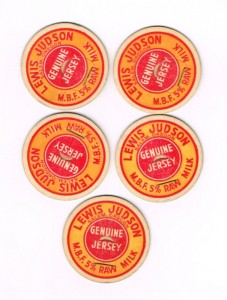
Bottle caps from the Judson Dairy which operated at 1000 Judson Street in Salem, today Gilmore Field and a residential subdivision. Photo Source: Willamette Heritage Center 0082.039.0002
Local agricultural products, like wool, vegetables, fruits, hops, and timber were the economic backbone of Salem’s industry and businesses like the Thomas Kay Woolen Mill, C.K. Spaulding Lumber Mill, and the dozens of canneries that processed and shipped Oregon produce all over the country. With the rapid growth of our city, it is sometimes incredible to believe that, just a few generations ago, many of our neighborhoods were home to orchards, dairies, farms and ranches.
I had a good reminder of just how close Salem’s rural boundaries used to be last week when I uncovered a series of bright orange and yellow caps from the Lewis Judson Dairy in themuseum’s collections. The dairy was located “at the end of Judson Street,” just hovering at the end of Salem’s city limits. In today’s terms, the farm itself encompassed much of what is now South Salem High School’s Gilmore Field and the residential neighborhood just to its west. Can you imagine cows running through the area now, instead of soccer players?
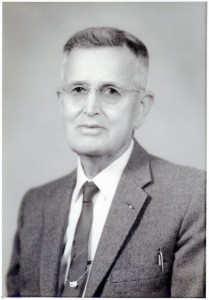
Lewis Edward Judson, Sr., proprietor of the Lewis Judson Dairy into the 1950s witnessed huge changes in the way we live during his 95 years. Photo Source: Willamette Heritage Center: 2010.056.0002
The dairy’s proprietor, Lewis Edward Judson, was born on the property in 1878. His grandfather was the Methodist Missionary Lewis Hubbell Judson who had come to work for Jason Lee’s mission in Oregon with the Great Reinforcement in 1840. His father, Robert T. Judson, started the family farm and his son Lewis got an early introduction to farming. While his obituary claims he ostensibly went to work as a young man as a teamster (in the 19th century version of the word, this is more likely to mean a man who drove animals, not trucks), he also claims to have continued farming on the side, and eventually went back and took over the family farm.
While it is likely there were milk cows on the farm since the beginning, Lewis E. Judson shifts from being listed as a “farmer” to a “dairyman” in the 1934 Salem City Directory, a title he carries until 1953, coincidentally, the same year he “sold” his cultivated fields to the Salem-Keizer school district for the sum of $10.00.[1] He died in December of 1973, just after reaching his 95th birthday.
Thanks to North Salem High School history teacher George Strozut and a 1960 interview by student Jim Hunnex,[2] we have more details about what life was like for Judson on the farm. In comparing the details of his childhood, I am reminded again of just how much Salem changed in the span of one man’s life. Hunnex reports:
Lewis Judson’s day started at 5:30 in the morning. He got up and dressed and had breakfast at 6:00. Dinner was at 12 noon and supper at 7 at night. Some of his chores were to bring in the wood and, as soon as he was old enough, he had to go to the barn and help with the hay.
Mr. Judson’s family house was a box house and was one story high. It was located about a mile from the road. The house is not standing now. In the kitchen they used iron frying pans and kettles, a butter church and butter mold. His mother cooked on an old fashioned wood stove. In Lewis Judson’s early day there was no ice box and they put such perishables as milk and butter in the cold open wells.
Back when Lewis Judson was young, Salem was considered a farming town. Most of the farms averaged around 300 to 320 acres. Usually found on every farm in the Willamette Valley was a house, barn, chicken house, potato hill and smoke house.
It wasn’t all work, either. Hunnex explained that Judson told him they did date, although his version of a date was “usually just for a buggy ride.”
Sources
[1] Marion County Deeds. Volume 453, page 100. Transaction made between Lewis E and Edith C. Judson and the School Distrcit No. 24 C.J. Marion County, Oregon on June 30, 1953. View index record to Marion County Deeds on FamilySearch website here (free to access, but must create user name). Deed Record can be accessed at the Marion County Clerk’s Office.
[2] Full interview text available at the Willamette Heritage Center, 2010.021.0124. Interview conducted by Jim Hunnex.
Chronological Listing in City Directories for Lewis E. Judson, Sr.
1909 Farmer, resides S.S. Judson near Berry
1911, 1913 Farmer, boards Mrs. Judson, Nob Hill Annex
1915 Judson Street, Nob Hill Annex
1917 Farmer, resides E. Judson
1924 Farmer, h. Judson SE corner S. Summer
1926/7 Farmer, h. e end Judson
1928/9-1932 Farmer
1934 Dairyman, h. RD4 Box 3D
1940/1-1942 Judson’s Dairy, 1000 Judson St
1945-1949 Farmer, 1000 Judson St
1951-1953/4 Dairyman, h. 1000 Judson St.
1955-1962 Listed with no occupation
1968-1972 Retired, 1000 Judson St.
More Source Material on Judson’s Life
Obituary Text for Lewis Edward Judson, Sr. on Salem Pioneer Cemetery Website.



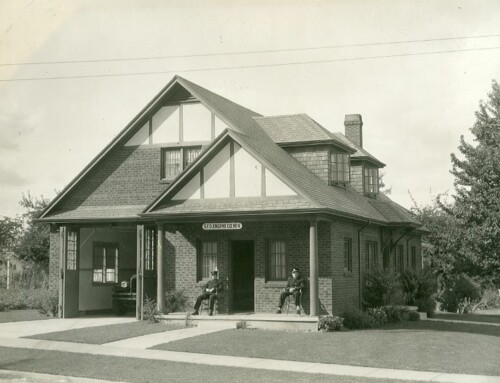
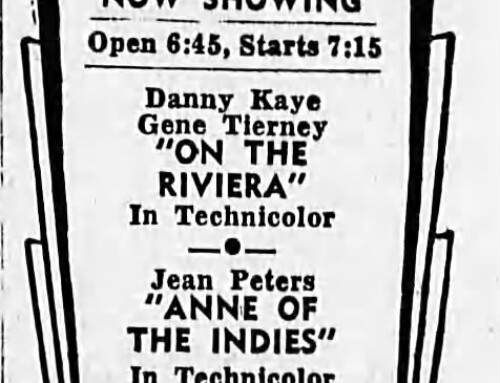
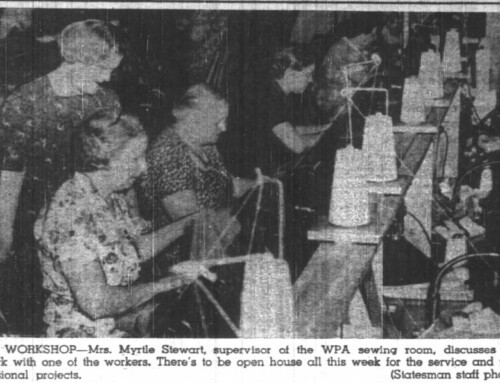
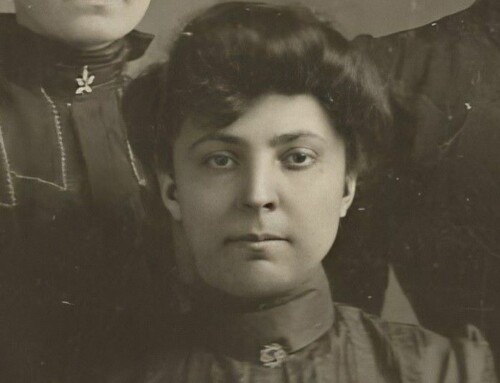
Leave A Comment